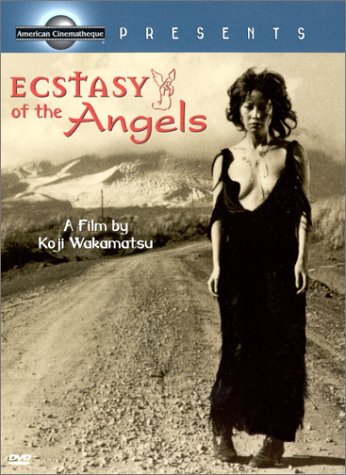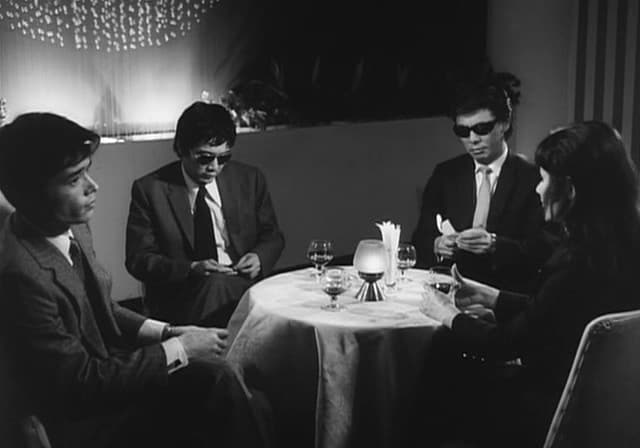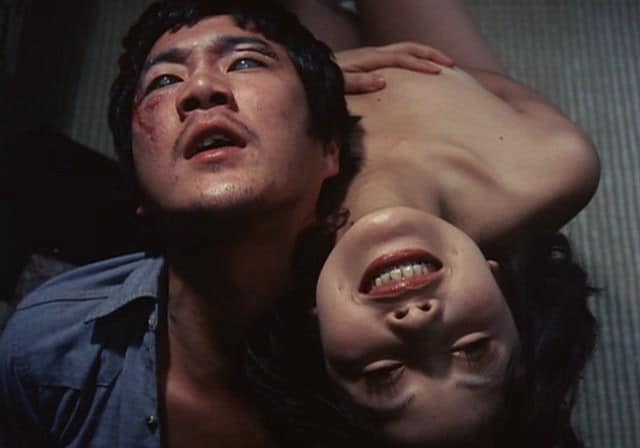The killer combo of Masao Adachi as scriptwriter and Koji Wakamatsu as director, and the juxtaposition of the exploitation elements of the pink films and intense political comments about the era resulted in a number of movies that were quite successful, despite their rather miniscule budget and the haste they were shot in. “Ecstasy of the Angels” however, differed because it was backed by Art Theatre Guild, which allowed for a much higher budget that had a direct impact on both its duration (it was almost a half hour longer than the majority of the previous Wakamatsu-Adachi films) and its sequences in color, which are much more frequent. To better explain this last point, we should note that Koji Wakamatsu had once stated “The mix between black-and-white and color was imposed by the distributor who financed the films. As he didn't have enough money to shoot everything in color, he figured we should do so at least with some sequences. This way, he can market the film as in color.”, to explain his tendency to include color sequences in his mostly monochrome movies.

The film functions as sequel of sorts to “Sex Jack” and its focus on the student movement, while being equally prophetic, a trait though that did not help on its theatre run, since its similarities with the Asama Mountain Lodge incident and the series of brutal murders of their own murders by the Red Army Faction, instigated the police to put pressure to the venues to take the film down.

The movie begins in a rather noir style, with a group of youths hanging out in a night club where a female singer performs, being the only customers there, before they proceed to cheer on their upcoming plans. Influenced by the Asaka Incident, where members of the Red Army Faction raided Asaka military base, in attempt to steal weapons that ended up in the death of a SDF officer, the film is soon transferred to a similar scene. A group of youths who call themselves with names of months, days or seasons, infiltrate a US military base, and succeed on stealing weapons through a tunnel-shaped warehouse (which was funnily spelled “wearhouse” in the film) but their efforts end in chaos. The US forces catch with up them, and the exchange of fire ends up with three members of the group dead and October, one of the leaders, left blinded, after the support of the September group fails to materialize. The remaining members manage to regroup in October's house, but their hideout is soon raided by another faction, the February one, who proceed on torturing October and the woman who is with him in order to learn about the location of the stolen weapons. Soon, a rather harsh revelation of betrayal comes to the fore, and the October faction decide to break away from the main party, and proceed with their own, much more radical and violent plans.

The style of “Ecstasy of the Angels” shares many similarities with “Sex Jack” particularly through the narrative form that follows a succession of violence, sex, and political discussion, which occasionally happen at the same time on screen. The differences, however, are quite significant also, as the bigger budget allowed Wakamatsu to include the noir scene previously mentioned, which also happens once more close to the end of the film in a triumph of style, coolness and minimalism, and a number of exterior action scenes. These are quite impressively directed, with Wakamatsu implementing a rather chaotic approach, which ends up, though, seeming realistic, in a testament to his abilities, with the same applying to both Hideo Ito's cinematography and Hajime Tanaka's editing.
Furthermore, the movie is much more violent than its predecessors were, with the scenes in the apartments being particularly brutal, and the fact that the victims carry their scars for the whole movie adding to this approach. Through this violence, and the overall approach to the student movement, whose members are, once more, presented as sex-crazed caricatures, the ironic stance towards them Adachi particularly harbored also comes to the fore. This approach also includes some subtle, but hilarious moments of humor, as in the scene where a messenger sent from Autumn visits October's house and the following dialogue comes up (this is not fully accurate but captures the spirit):
October: What did Autumn say?
Messenger: That you are to disband your group
October: Anything else?
Messenger: That she is thinking of you when she has sex with me

“Ecstasy of the Angels” is another film that is hard to watch due to its intense exploitation elements and the fact that it demands at least partial knowledge of the events that shook Japan at the time, from the viewer. At the same time, however, and through its more significant budget that resulted in a much more entertaining movie, and a number of stills that have become classic, emerges as truly worthy spectacle, particularly for those who can see beyond the sex and the violence.















